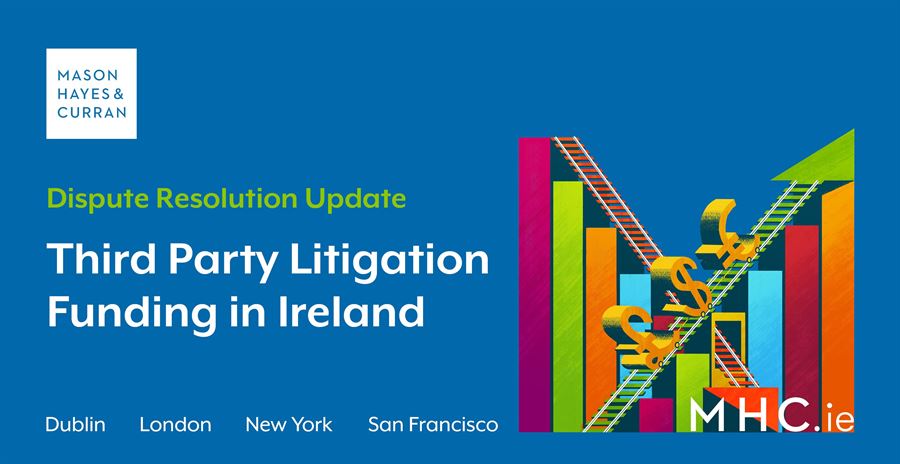Dispute Resolution Update: Third Party Litigation Funding in Ireland

The law on third party litigation funding in Ireland has been the subject of a number of significant superior court decisions in recent years. These have defined what is and is not currently allowed. We take a look at the current position.
Introduction
The type of litigation funding that we are presently concerned with is where a third party, who is not a party to the proceedings in question, provides funding so that they can proceed. In Ireland, this type of funding remains subject to the ancient rules of maintenance and champerty. Maintenance is the funding of litigation in which the funder has no interest. Champerty is the funding of litigation in exchange for a share of the proceeds of that litigation. Both maintenance and champerty remain criminal offences and civil wrongs in Ireland. As such, financial institutions need to be aware of these rules for their own compliance regimes. Although these rules have been abolished in most other common law jurisdictions, they maintain what the courts have recently described as a “practical vibrancy” in Ireland. In interpreting and applying these rules, recent court decisions have provided welcome clarity on what is and is not currently allowed.
What is currently allowed
Two types of third party litigation funding are currently allowed in Ireland as follows:
-
Funding by a third party with a legitimate interest in the proceedings, such as a creditor or a shareholder of a company that is a party to the litigation in question. This was approved in the case of Thema International Fund v HSBC International Trust Services (Ireland) Ltd. It is important to note that these third party funders risk being made personally liable for the costs of the litigation if the party that they are funding ultimately loses the case in question.
-
Funding litigation on foot of an “after the event” insurance policy. This was approved in the case of Greenclean Waste Management v Leahy. The third party funder in this instance is the insurer who provides the coverage. These policies are generally taken out by a plaintiff after a dispute has arisen and are designed to provide protection to that plaintiff if they are unsuccessful in the litigation in question. Typically, the insurance premium is only paid if the plaintiff is successful. These policies can also be used to defeat an application by a defendant for security of costs in certain circumstances.
What is currently not allowed
In the 2018 case of Persona Digital Telephony Limited v The Minister for Public Enterprise, the Irish Supreme Court confirmed that professional “for profit” third party litigation funding remains unlawful in Ireland. This type of funding is where an entity, usually a professional litigation funder, with no connection to or legitimate interest in the case in question provides funding in relation to the case in return for a profit. This is unlike the current position in the UK and other common law jurisdictions where this type of funding is allowed. Similarly and more recently, the Irish Supreme Court held in the case of SPV Osus Ltd v. HSBC Institutional Trust Services (Ireland) Limited & Others that an assignment of a right to litigate to an unconnected third party which has no legitimate interest in the cause of action offends the rules of maintenance and champerty and is likewise void under Irish law.
Conclusion
In its decision in the Persona case, the Supreme Court stated that any change in the law in Ireland relating to professional third party “for profit” litigation funding should come by way of legislation enacted by the Irish parliament rather than by way of a court decision. However, no such legislative change has yet taken place, although there have again recently been hints that this may be in the pipeline.
For example, on 29 January 2020, Chief Justice Frank Clarke of the Irish courts published a report that he had commissioned the EU Bar Association and the Irish Society of European Law to prepare in relation to litigation funding and class actions. This report strongly recommends that proper provision is made in Ireland for representative class actions and litigation funding. The report set out that both are essential mechanisms of access to justice, having been recognised as such across multiple jurisdictions.
Despite these loud calls for reform however, the present position is that professional “for profit” third party litigation funding remains unlawful in Ireland.
For more information relating to lawful litigation funding in Ireland, contact a member of our Dispute Resolution team.
The content of this article is provided for information purposes only and does not constitute legal or other advice.
Share this:



